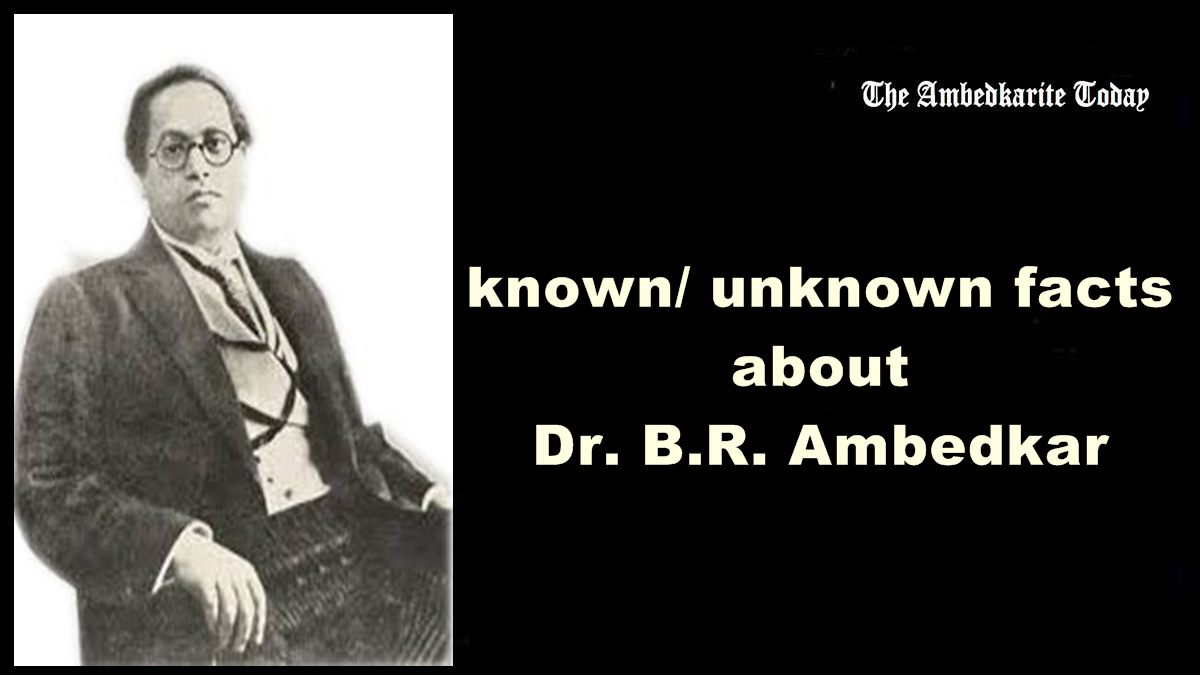known/ unknown facts about Dr. B.R. Ambedkar
Bhimrao Ramji Ambedkar popularly known as Babasaheb, was an Indian jurist, economist, politician and social reformer who inspired the Dalit Buddhist movement and campaigned against social discrimination against Untouchables (Dalits), while also supporting the rights of women and labour.
There are many more known/ unknown facts about Dr. B.R. Ambedkar. Knowing these facts, as an Indian, we will be surely proud of this Great Revolutionary. The below are some of the details about Dr. B.R. Ambedkar that every Indians must be aware of.
Some of the important Facts about Dr. B.R. Ambedkar
1. Only an Indian who top in top world 1st talented person, according to Cambridge University, England 2011.
2. Babasaheb Ambedkar was the first Indian to pursue an Economics doctorate degree abroad.
3. 1st Indian who graduated DSc in Economics.
4. 1st Ph.D in Economics and 1st double doctorate in Economics holder in South Asia.
5. RBI was conceptualized on 1st April 1935 by the guidelines from Babasaheb Ambedkar’s book “Problem of Rupee:its origin and its solutions”
6. Indians have the right to vote without bias in gender or caste or class or literacy or religion. It was Dr.Babasaheb Ambedkar who voiced as the first person in India for the ‘Universal Adult Franchise’ before the Southborough Commission.
7. Savior of labours, brought 8 hours of duty for labours in India. Dr. Babasaheb Ambedkar changed the working time from 12 hours to 8 hours in the 7th session of Indian Labour Conference in New Delhi, November 27, 1942. which became a light for workers in India.
8. Revolutionary Dr. Babasaheb Ambedkar was the first person who brought “Equal pay for equal work irrespective of the sex” in India in terms of Industrial workers as a Labour Minister in the Viceroy executive council.
9.Dr Babasaheb Ambedkar framed many laws for women workers in India such as ‘Mines Maternity Benefit Act’, ‘Women Labour Welfare Fund’, ‘Women and Child Labour Protection Act’, ‘Maternity Benefit for Women Labour’, and ‘Restoration of Ban on Employment of Women on Underground Work in Coal Mines’.
10. Employees State Insurance (ESI) helps the workers with medical care, medical leave, physical disability caused due to injuries sustained during work, workmen’s compensation and for the provision of various facilities. Dr Babasaheb Ambedkar enacted and brought it for the benefit of workers. India was the first nation among East Asian countries to bring Insurance Act for the well-being of employees.
11. ‘Dearness Allowance’ (DA) & ‘Leave Benefit’ and ‘Revision of Scale of Pay’ were introduced by Dr. Babasaheb Ambedkar
12. As Labour Member of the Viceroy’s Council, Dr. Babasaheb Ambedkar initiated programs to increase the productivity of workers, by providing them with education and important skills required for performing jobs better, health care and maternity leave provisions for women workers.
13. Dr Babasaheb Ambedkar set up the ‘Tripartite Labour Council’ in 1942 to safeguard social security measures for the workers, giving equal opportunity to the workers and employers to participate in the formulation of labour policy and strengthening the labour movement by introducing compulsory recognition of trade unions and worker organizations.
14. Labour was placed in the ‘Concurrent List’, ‘Chief and Labour Commissioners’ were appointed, the ‘Labour Investigation Committee’ was formed – credit for all these goes to Dr Babasaheb Ambedkar.
15. ‘Minimum Wages Act’ was Dr Babasaheb Ambedkar’s contribution so was the ‘Maternity Benefit Bill’, empowering women workers.
16. If there are ‘Employment Exchanges’ in India today, it is because of Dr Babasaheb Ambedkar’s vision.
17. If workers can go on strike for their rights, it is because of Babasaheb Ambedkar – he had clearly recognised the ‘Right to Strike’ by the workers.
18. On 8th November, 1943 Dr Babasaheb Ambedkar brought the ‘Indian Trade Unions (Amendment) Bill’ for compulsory recognition of trade unions.
19. He was the pioneer of Multipurpose river projects in India. Dr. Babasaheb Ambedkar was the creator of Damodar Valley project, Bhakra-Nangal Dam project, Sone River Valley project and Hirakud dam project. In 1945, under the chairmanship of Dr. Babasaheb Ambedkar, it was decided to invest in the potential benefits of controlling the Mahanadi for multi- purpose use.
20. Dr. Babasaheb Ambedkar had suggested division of Madhya Pradesh into northern and southern state’s. He had also suggested division of Bihar split into two, with Patna and Ranchi as the capitals way back in 1955 for better development of these states. After almost 45 years both states were divided and Chhattisgarh and Jharkhand were formed in the year 2000.
21. Dr. Babasaheb Ambedkar emphasized on the significance and need for the “Grid System ” which is still working successfully even today. If today power engineers are going abroad for training, the credit goes to Dr. Babasaheb Ambedkar again, who as a leader of labour Department formulated the policy to trained best engineers overseas.
22. Dr. Babasaheb Ambedkar established “Central Technical Power Board ” (CTPB) for power system development., hydro power station sites, hydro electric surveys, analyzing problem of electricity generation and thermal power station investigation.
23. Babasaheb Ambedkar opposed Article 370 in the Constitution, which gives a special status to the State of Jammu and Kashmir, and it was put against his wishes.
24. Dr.Babasaheb Ambedkar resigned from the post of the first Law Minister of India when his noble ‘Hindu Code Bill’ a women’s Rights for Indian Women dropped by then Prime Minister Nehru. The contribution of Dr.Babasaheb for women empowerment in India is totally ignored and hiding. For three years, he fought to get the Bill passed. It was the greatest ever social reform in India. It is nothing but declaration of women rights. It spoke of giving back dignity to Indian women and giving equal rights to men and women.
25. The man who started the provision for a finance commission every five year in the constitution was none other than Dr. Ambedkar

